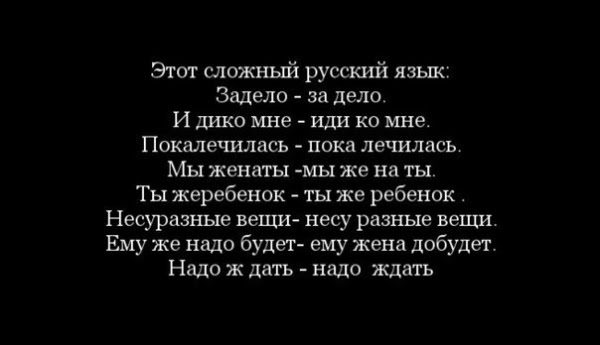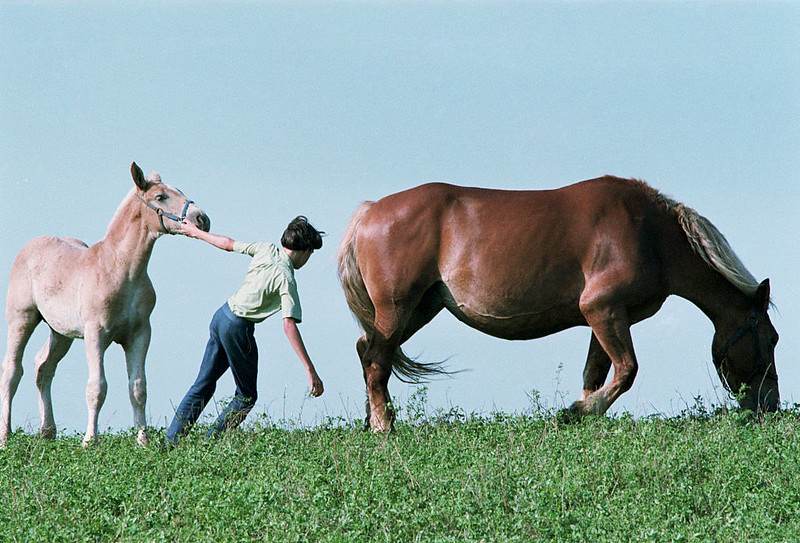Russian phrases-homophones Posted by bota on Dec 4, 2020 in language, Russian for beginners, Uncategorized
You might have seen a post or a meme of the “good luck non-native speakers” nature before, and not necessarily about Russian grammar ( think of “Who’s on first” by Abbott and Costello). The internet is full of them and, frankly, some are a hoot and a half. But while I’m also guilty of “sharing” and “liking” grammar and language memes, I would like to take my time today to dissect one of those “Russian is so confusing” memes.
1. И ди́ко мне vs иди́ ко мне
И дико мне – it’s odd to me
И ди́ко мне что ты́ не со мно́й. It’s odd to me that you’re not with me.
иди́ ко мне – come to me
“Иди́ ко мне, дорогу́ша” сказа́ла она́ ла́сково. “Come to me, my darling” she said sweetly.
2. Покале́чилась vs пока́ лечи́лась
Покале́чилась – injured oneself (fem.)
И когда́ ты так покале́чилась? And when did you injure yourself like this?
Пока́ лечи́лась – while I/she/you (fem.) was/were undergoing medical treatment or while I/she/you (fem.) was/were recovering
Я жила у ба́бушки пока́ лечи́лась от просту́ды. I stayed at my grandma’s while I was recovering from a cold.
3. Заде́ло – за дело
Заде́ло – (this) got under one’s skin
То, что Антон сказа́л ей во вре́мя ссо́ры заде́ло её. What Anton said during their fight got under her skin.
On its own “за де́ло” means “let’s get to work” though the collocation “приня́ться за де́ло” as in “to get started on something/on this task” is also used frequently.
За де́ло, друзья́! Let’s get to work, my friends!
4. Несура́зные ве́щи vs несу́ ра́зные ве́щи
Несура́зные ве́щи – absurd things
Во вре́мя ссо́ры молодожены вспо́мнили друг дру́гу са́мые несура́зные ве́щи из про́шлого. The newlyweds recalled the most absurd things from the past about each other during their fight.
(Я) несу́ ра́зные ве́щи – (I’m) carrying a variety of things
The next homophone phrases can be full sentences on their own and rely on “же” (sometimes shortened to “ж”) that can either be a particle or conjunction.
5. Мы жена́ты vs мы же на ты
Мы женаты – we are married
Мы же на “ты”? – we are on informal terms, aren’t we? (lit. we address each other using the informal “ты” pronoun, don’t we?) This one can be both a question and a declaration, depending on the speaker’s intonation.
6. Ты жеребёнок vs ты же ребёнок
Ты жеребёнок – you are a foal (foal = a young horse)
Ты же ребёнок – you are a child. This one also can be both a question and a declaration.
7. Ему́ же на́до бу́дет vs ему́ жена́ добу́дет
Ему́ же на́до бу́дет – he will need it
Eму́ жена́ добу́дет – his wife will provide it for him
8. На́до ж дать vs на́до ждать
На́до ж дать – It needs to be given
на́до жда́ть– (We) need to wait
Russians have already availed themselves of the power of homophones by employing their attention-grabbing magic in music. Here are two exceptional and popular Russian songs with well-played homophones. The first one is from the song by Игорь Саруханов (Igor Sarukhanov) “Скрипка-лиса” that literally translates to “violin-fox” but is often labeled as “скрип колеса” (“squeak of the wheel”).
And while some sources claim that the chorus goes:
Скрипка-лиса,
Лужи и грязь дорог.
[Violin-fox
Puddles and road mud]
Many people say it makes more sense for the words to be:
Скрип колеса,
Лужи и грязь дорог.
[Squeak of the wheel,
Puddles and road mud]
Another great and more modern Russian hit is by Zivert and Баста called “не болей”. While the song title appears to simply mean “stay well” (lit. “don’t be ill”) the chorus interplays the phrase with “с неба лей” which means “pour from the sky”:
С неба лей, с неба-неба-неба-неба лей
Дождь пока меня ты ждешь
Не болей, небо-небо-небо-не болей
[Pour rain from the sky
While you wait for me
Stay well]
What other Russian homophones or homophone phrases do you know?

Build vocabulary, practice pronunciation, and more with Transparent Language Online. Available anytime, anywhere, on any device.







